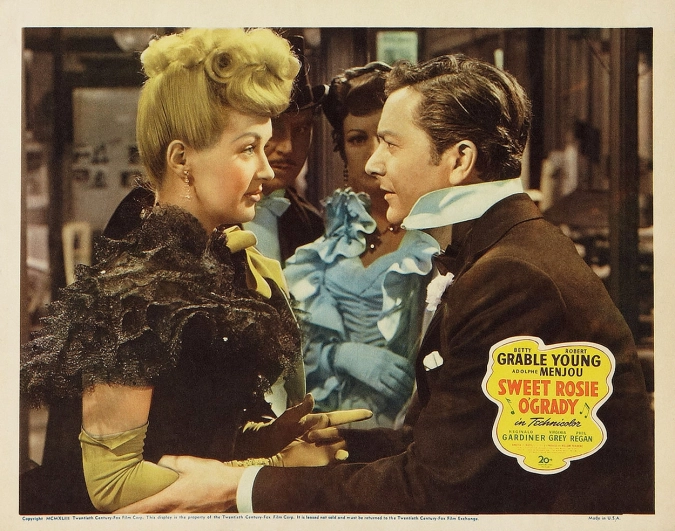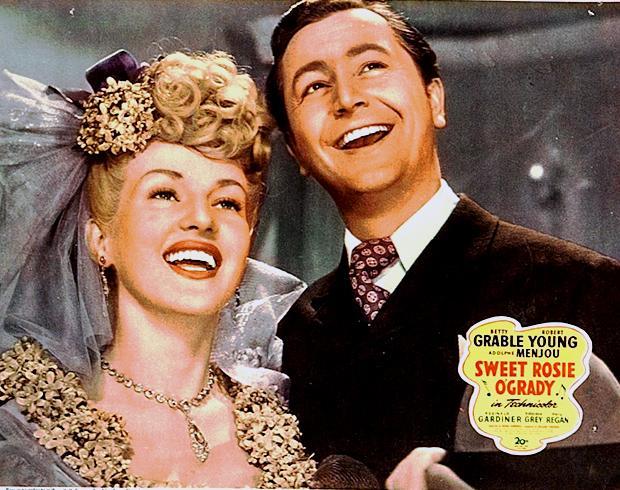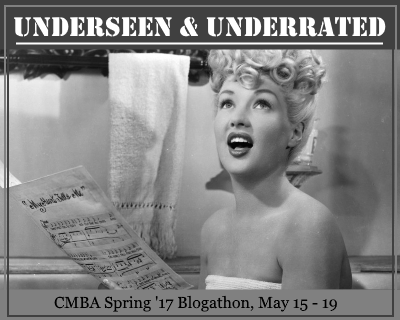1943 was a banner year for Betty Grable. Her popularity soared into the stratosphere becoming the number one female star of the times. In February of that year Grable’s famous gams were immortalized in cement at Grauman’s Chinese Theatre and they were the subject of an entire spread in Life magazine that June. In the summer of ’43 Grable married bandleader, Harry James and her two movie releases of the year, Irving Cumming’s Sweet Rosie O’Grady and Walter Lang’s Coney Island were smash hits for 20th Century Fox. Today I’m here to laud one of those movies, my favorite of Grable’s colorful, tuneful wartime escapist fare, Sweet Rosie O’Grady.

I don’t know if I’ll do Sweet Rosie O’Grady justice, but I haven’t been this excited about commenting on a movie in a long time. I absolutely adore this battle of the sexes presented in glorious Technicolor and with utmost care. There is not a hair out-of-place in this production nor will you get the sexual innuendos fans of pre-code require. This is squeaky clean fun featuring an all-too-often forgotten, but supremely talented star. Part of the reason why I chose to spotlight a Grable movie for this CMBA blogathon focused on Underseen and Underrated movies is because I’m still reeling from my visit to 20th Century Fox studios last year. My friend, the estimable Danny Miller will corroborate this story as well as my outrage.
During our tour of the studio we went into the gift shop where I saw Shirley Temple and Marilyn Monroe film collections settled on a huge display. I turned to the young man who worked there and asked, “where’s the Betty Grable collection?” to which he replied, “WHO?”

I admit I was miffed. And I didn’t bother to ask about Alice Faye who preceeded Grable and followed Temple as the Fox musical blonde of repute because what would’ve been the point? Incidentally, Sweet Rosie O’Grady was originally intended as a vehicle for Faye, but the movie went Grable’s way because Faye was pregnant. Anyway, onto Sweet Rosie O’Grady…
Main Players
Betty Grable is Madeleine Marlowe / Rosie O’Grady
Robert Young is Sam Magee
Adolphe Menjou is Thomas Moran
Reginald Gardiner is Charles, Duke of Trippingham
Virgina Grey is Edna Van Dyke
The Story
Yankee sensation, Madeleine Marlowe (Grable) is finishing her successful run in “The Belle of Bond Street” at London’s leading playhouse, the Trafalgar Square Theatre, when Charles, the Duke of Trippingham (Gardiner) proposes to her. Madeleine doesn’t love Charles, but the prospect of catching a man with a title is too good to pass. So much so, in fact, that she knows Charles is broke and would be marrying her for her money.
Fast forward a few days and we see Madeleine on the boat back to America where her manager, Skinner (Alan Dinehart) and assistant, Edna (Grey) come upon some articles written by one Samuel A. McGee (Young). The McGee articles expose Madeleine Marlowe’s true identity. It turns out that “The Toast of the Continent” is none other than the title-hungry, former Brooklyn Burlesque Queen, Rosie O’Grady. Well, you can just imagine how Rosie’s Irish temper flares up!
The next thing you know Marlowe/O’Grady is in a war of words with Sam McGee – he in print and she in song. Each gets the better of the other in embarrassing, but enjoyable fashion. What’s not expected (except to us) is that O’Grady falls for McGee and McGee falls for O’Grady.

The opening of this story follows a terrific title sequence with a chorus singing the title song, which is featured later when Marlowe stars in a show titled, “Sweet Rosie O’Grady.” The entire soundtrack of this movie is fantastic although a favorite is the ballad, “My Heart Tells Me” by Harry Warren and Mack Gordon. I’ve loved that song since I first saw this movie on The 4:30 Movie on New York’s local ABA affiliate, Channel 7. Oh, the good ol’ days!
Betty sings “My Heart Tells Me” in a nightclub in the movie, but the standout – as the New York Times reviewer noted in 1943 – is when “blue-eyed, platinum-haired Miss Grable sings dreamily in a bathtub with soapsuds up to her glistening shoulders.” This particular scene proved immensely important to me as a young movie fan because it was the first time I realized movie stars could summon up entire invisible orchestras whenever they sang.
The reviewer then goes on to comment on the reason 20th Century Fox had Grable under contract – her legs – and ends with saying Grable has the screen personality of a marshmallow. Needless to say I wholeheartedly disagree with that reviewer. Yes, Grable movies are fluff for the most part, but she is always the best reason to watch them. With a strong, lovely voice and skilled dancing prowess, Grable proved her legs were useful for more than bait for the male masses. Sweet Rosie O’Grady allows her ample opportunity to show why audiences adored her beyond that. Not only could Miss Grable play a high-brow songstress convincingly, but she does the Brooklyn dame part as well and looks fantastic in every scene. In addition, her comedic chops bettered the material.

I’m also not ashamed to say that Betty Grable had a huge influence on my burgeoning love of standards as she was the first I heard singing them in her movies. By the way, you get to hear Robert Young sing a bit in this too and does quite well for himself in that arena as well as a comedic/romantic foil for Grable’s graces. I remember being duly impressed the first time I saw Sweet Rosie O’Grady. The old guy from Marcus Welby, M.D. was in a movie with Betty Grable! WHO KNEW?!

Ken Englund wrote the screenplay for O’Grady based on stories by William R. Lipman, Frederick Stephani and Edward Van Every. The movie is a remake of Tay Garnett’s Love Is News (1937) and was later remade as Robert Sinclair’s The Wonderful Urge in 1948 in which Reginald Gardiner plays another version of the snooty, but broke Englishman with a title. Gardiner played this type of character in numerous 20th Century Fox films of the era, including a few others starring Betty Grable.
Sweet Rosie O’Grady also features enjoyable supporting players like Adolphe Menjou who plays Tom Moran, Sam Magee’s editor and Sig Ruman is Joe Flugelman, the man who gave Rosie O’GRady her start in Brooklyn. There are also luscious period costumes and sets that do Technicolor proud from beginning to end. The presentation here is what make it a worthwhile watch although – again – if it’s a fun distraction you’re after you can’t go wrong with Sweet Rosie O’Grady. It’s a delight.
◊
Please visit the Classic Movie Blog Association for more recommendations on Underseen and Underrated movies. And THANK YOU to whichever power that be decided to use Betty singing in the bathtub as a banner!



Will definitely check this one out, as I have not seen this Betty Grable film. Thanks for the suggestion!
My pleasure. Let me know what you think. 🙂
I can’t believe that there’s a Grable picture that I don’t recall. How could I have missed it? I’m a gal who often bemoans the fact that life isn’t like a movie musical, in particular a 20th Century Fox Technicolor musical (although I’ll take the black and white any old time as well).
I feel your outrage at the gift shop and at the clerk. Wherever I have worked in my life I felt it was important to learn about the company, what they did, and their history.
Oh, what a fan of Betty Grable I am! How dare that Fox guy ask, “Who is Betty Grable??” I always liked this movie, as well as the other film she made the same year, “Coney Island.” You have done our Betty justice and I thank you for a fun read!
Rupert
Thanks much, Rupert! Betty deserves several shout outs. 🙂
nor will you get the sexual innuendos fans of pre-code require
I seem to recall a certain Middle Eastern saloon keeper remarking something about “poor salesmanship.”
All seriousness aside, this was a splendid write-up, A.B. (I plead guilty, though, that I would have enjoyed this one more had Mrs. Harris not been great with child.)
Yeah, whatever! 😉 Thanks, Ivan. Not perfect, but loads of fun.
I haven’t seen this movie since the last time I watched The 4:30 Movie on Channel 7 (ABC) in New York! What a blast from the past. But I do remember several Betty Grable movies where the star credits were sung…”Betty Grable, Robert Young, Adolph Menjou…”
That’s how the credits are here and I love them!!